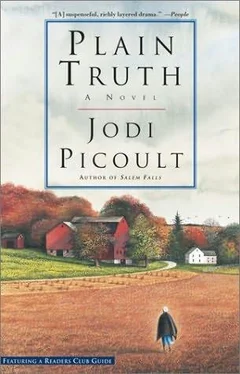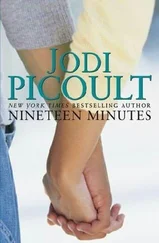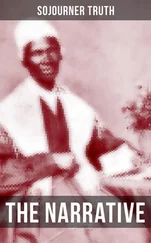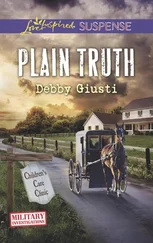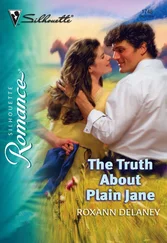“I’d noticed. No chores.”
“Well, we still have chores. But we also have time to relax.” Katie looked up at her. “I thought that maybe, it being Sunday, you and I could do things different, too.”
Ellie felt something tighten inside her. Was Katie going to suggest they skip town? Go find a pack of cigarettes? Give each other a few hours of no-holds-barred privacy?
“I was thinking that maybe we could be friends. Just for this afternoon. You could pretend that you met me coming to visit the farm you were at when you were a kid, instead of the way it really happened.”
Ellie put down her book. If she won Katie’s friendship and got the girl to open enough to spill out the truth, she might not need Coop to come evaluate her at all. “When I was a kid,” Ellie said slowly, “I used to be able to skip stones farther than any of my cousins.”
A smile blossomed over Katie’s face. “Think you still can?”
They jostled through the door and struck out across the field. At the edge of the pond, Ellie reached for a smooth, flat rock and tossed it, counting as it bounced five times over the water. She wiggled her fingers. “Haven’t lost the touch.”
Katie picked up her own stone. Four, five, six, seven skips. With a broad smile, she turned to Ellie. “Some touch,” she teased.
Ellie narrowed her eyes in concentration and tried again. A moment later, Katie did too. “Ha!” Ellie crowed. “I win!”
“You do not!”
“I beat you by a yard, fair and square!”
“That’s not what I saw,” Katie protested.
“Oh, right. And your eyewitness accounts these days are so accurate.” When Katie stiffened beside her, Ellie sighed. “I’m sorry. It’s hard for me to separate from why I’m really here.”
“You’re supposed to be here because you believe me.”
“Not necessarily. A defense attorney is paid to make a jury believe whatever she says. Which may or may not be what her client has told her.” At Katie’s baffled expression, Ellie smiled. “It probably sounds very strange to you.”
“I don’t understand why the judge doesn’t just pick the person who’s telling the truth.”
Reaching for a piece of timothy grass, Ellie set it between her teeth. “It’s not quite as simple as that. It’s about defending people’s rights. And sometimes, even to a judge, things aren’t black and white.”
“It is black and white, if you’re Plain,” Katie said. “If you follow the Ordnung, you are right. If you break the rules, you get shunned.”
“Well, in the English world, that’s communism.” Ellie hesitated. “What if you didn’t do it? What if you were accused of breaking a rule, but you were perfectly innocent?”
Katie blushed. “When there’s a members’ meeting for discipline, the accused member has a chance to tell his story too.”
“Yeah, but does anyone believe him?” Ellie shrugged. “That’s where a defense attorney comes in-we convince the jury that the client may not have committed the crime.”
“And if he did?”
“Then he still gets acquitted. That happens sometimes, too.”
Katie’s mouth dropped open. “That would be lying.”
“No, that would be acting as a spin doctor. There are many, many different ways of looking at what’s happened to bring someone to trial. It’s only considered lying if the client doesn’t tell the truth. Attorneys-well, we can say just about anything we want as an explanation.”
“So . . . you would lie for me?”
Ellie met her gaze. “Would I have to?”
“Everything I’ve told you is the truth.”
Sitting up, Ellie crossed her legs. “Well, then. What haven’t you told me?”
A sparrow took off in flight, casting a shadow across Katie’s face. “It’s not our way to lie,” she said stiffly. “It’s why a Plain person can stand up for himself in front of the congregation. It’s why defense attorneys don’t have a place in our world.”
To her surprise, Ellie laughed. “Tell me about it. I have never in my life stuck out like such a sore thumb.”
Katie’s gaze traveled from Ellie’s running shoes to her sundress to the small, dangling earrings she wore. Even the way Ellie sat-as if the grass was too scratchy to let the backs of her legs rest upon it-was slightly uncomfortable. Unlike the hordes of people who streamed into Lancaster County to get a glimpse of the Amish, Ellie had never asked for this. She had done Aunt Leda a favor, and it had mushroomed into an obligation.
Katie knew how she had felt, from her visits to Jacob. Putting on the costume of a wordly teenager had never made her one. Ellie might think she espoused individuality, but being yourself in a culture where other Englischers were busy being themselves was a far cry from being yourself in a culture where the people were all intent on being the same-but different from you.
A world that was crowded with people could still be a very lonely place.
“I can fix that,” Katie said aloud. With a big grin she reached into the lake, scooped up some water, and tossed it onto Ellie.
Sputtering, Ellie jumped up. “What did you do that for?”
“Wasser,” Katie said, splashing her again.
Ellie shielded herself with her hands. “What’s a what?”
“No, wasser. It’s Dietsch for water.”
After a moment, Ellie understood. She took this small gift and let it settle inside her. “Wasser,” she repeated. Then she pointed to the field. “Tobacco?”
“Duvach.”
Katie beamed when Ellie tried the word. “Gut! Die Koo,” she said, gesturing at a grazing Holstein.
“Die Koo.”
Katie held out her hand. “Wie bist du heit. It’s nice to meet you.”
Ellie slowly extended her own hand. She looked deeply into Katie’s eyes for the first time since she’d arrived at the district court yesterday. The lightness of the afternoon, of the Dietsch lesson, fell away until all the two women knew was the pressure of their palms against each other, the heady hum of the crickets, and the understanding that they were starting over. “Ich bin die Katie Fisher,” Katie said quietly.
“Ich bin die Ellie Hathaway,” Ellie answered. “Wie bist du heit.”
• • •
“I’m going to get the popcorn before the movie starts,” Jacob said, standing. When Katie began to rummage through her pockets for the money her Mam always sent along, Jacob shook his head. “My treat. Hey, Adam, keep an eye on her.”
Katie slouched in her seat, annoyed that her brother would think of her as a child. “I’m seventeen. Does he think I’m going to wander away?”
Beside her, Adam smiled. “He’s probably more worried that someone’s gonna steal his pretty little sister.”
Katie blushed to the roots of her hair. “I doubt it,” she said. She was unused to compliments that referred to her beauty, rather than a job well done. And she was uncomfortable being alone with Adam, who had been invited by Jacob to join them.
Katie did not wear a watch, and she wondered how long it would be until the film began. This would be her fourth movie, ever. It was supposed to be a love story-such a funny concept, for a two-hour movie. Love wasn’t supposed to be about a moment where you looked into a boy’s eyes and felt the world spin from beneath your feet; when you saw in his soul all the things that were missing in yours. Love came slow and surefooted and was made of equal measures of comfort and respect. A Plain girl wouldn’t fall in love, she’d sort of glance down and realize she was mired in it. A Plain girl knew she loved someone when she looked out ten years from now and saw that same boy standing beside her, his hand on the small of her back.
She was dragged from her thoughts by the sound of Adam’s voice. “So,” he said politely, “do you live in Lancaster?”
Читать дальше
